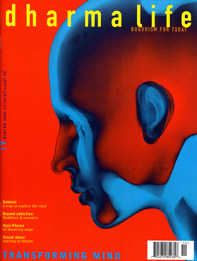The Ronin
William Dale Jennings
Tuttle 2001
$12.95/£9.99 p/b
William Dale Jennings' The Ronin is a novel based upon a Zen myth. The story traces the rise of a wandering swordsman – the 'Ronin' of the title – through Japanese society, and then charts his fall from grace and the strange asceticism that follows from his renunciation of the sword.
The first part of The Ronin resembles nothing so much as A Clockwork Orange brush-painted on silk by a Zen master. Within the first few pages the warrior's blade has been wiped clean of gore several times. No insult is too slight to deserve death, no maiden safe from the second great weapon in the hero's armoury, his 'peasant potence', as Jennings calls it.
The hero rises to become samurai-in-residence at the court of 'a Lord of middle importance', whom he eventually kills. Fleeing the wrath of the courtiers, he sets out upon the road with the Lord's wife until, overwhelmed by the recollection of his crimes, the Ronin flings away his sword and sets out anguished and alone. At last he finds for himself a new purpose as an ascetic of sorts, patiently hollowing a tunnel through the heart of a mountain, while the son of the Lord of Middling Importance seeks him out to wreak his revenge.
It is hard to know what to make of The Ronin. Whether running his steel through an aged monk, dividing a young swordsman head to toe, hanging a peasant girl from the ceiling by her hair and subjecting her to humiliation until she begs for sex, or repeatedly raping a noblewoman until she falls in love with his overwhelming manhood, the Ronin's exploits are told with a bizarre mixture of relish and cool Zen detachment. This admiration for such uncompromising brutality coupled with the sense that, in this floating world, suffering is ultimately illusory, is unsettling. Although Jennings claims this tale is one of those legends 'containing everything it is necessary to know', it strikes me that this book not only contains much that is unnecessary to know, but also that it may omit a great deal that is necessary. While this strange, occasionally elegant, and frequently bloodthirsty book has the air of a work of great wisdom and profundity, I suspect it is merely Samurai swagger. Bloodshed is bloodshed – and no amount of faux-Zen paradox-mongering can change that.
Will Buckingham is currently completing his second novel and writing a book on Buddhism and death



